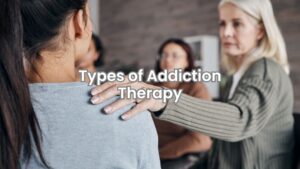Addiction is a complex and challenging disease, affecting millions worldwide and impacting not just individuals but also their families and communities. While the grip of substance use disorder can feel overwhelming, there is immense hope and a clear path forward through addiction therapy. More than just symptom management, addiction therapy delves into the root causes of addiction, equipping individuals with the tools and strategies needed to build a fulfilling life in recovery.
At Ridgeline Recovery, we understand the intricate nature of addiction, acknowledging it as a chronic illness that requires extensive and compassionate care. Just as medical science has advanced our understanding of physical ailments, behavioral science has illuminated the pathways to healing from addiction.

The Science Behind Healing: How Addiction Therapy Works
To truly grasp the power of addiction therapy, it helps to understand the fundamental ways it addresses the multifaceted nature of addiction. Addiction isn’t merely a lack of willpower; it involves significant changes in the brain’s reward system, motivation, memory, and related circuitry. Over time, repeated substance use can hijack these systems, making it incredibly difficult for individuals to stop without professional help.
Addiction therapy, rooted in evidence-based practices, works to:
- Rewire the Brain: Through various therapeutic modalities, individuals learn to identify triggers, develop coping mechanisms, and challenge negative thought patterns that contribute to substance use. This process, often referred to as cognitive restructuring, helps to gradually re-establish healthier neural pathways.
- Address Underlying Issues: Often, addiction co-occurs with other mental health conditions such as depression, anxiety, trauma, or PTSD. Effective addiction therapy recognizes this interplay and provides integrated treatment, addressing both the substance use disorder and any co-occurring mental health challenges simultaneously. This holistic approach is crucial for sustainable recovery.
- Develop Essential Life Skills: Many individuals struggling with addiction may lack healthy coping skills, problem-solving abilities, or effective communication strategies. Therapy helps to build these essential life skills, empowering individuals to navigate daily stressors, manage emotions, and build supportive relationships without resorting to substance use.
The National Institute on Drug Abuse (NIDA) emphasizes that addiction treatment must be specialized to the individual, recognizing that “no single treatment is appropriate for everyone.” This individualized approach is a cornerstone of effective addiction therapy, ensuring that treatment plans align with an individual’s unique needs, circumstances, and recovery goals.

Diverse Approaches to Healing: Types of Addiction Therapy
Addiction therapy encompasses a wide range of therapeutic modalities, each designed to address different aspects of the recovery journey. While individual needs will dictate the most suitable approach, here are some of the most commonly used and effective therapies:
- Cognitive Behavioral Therapy (CBT): A highly effective and widely used therapy, CBT helps individuals identify and change problematic thought patterns and behaviors that contribute to substance abuse. It teaches practical skills for coping with cravings, avoiding high-risk situations, and managing triggers. For example, a person might learn to identify the thought, “I need a drink to relax,” and replace it with a healthier coping strategy like deep breathing or calling a supportive friend.
- Dialectical Behavior Therapy (DBT): Often used for individuals with co-occurring disorders, DBT focuses on teaching skills in four key areas: mindfulness, distress tolerance, emotion regulation, and interpersonal effectiveness. It helps individuals manage intense emotions, reduce self-destructive behaviors, and improve relationships, all of which are vital for sustained sobriety.
- Motivational Interview (MI): This approach helps individuals resolve their ambivalence about engaging in treatment and stopping drug use. MET aims to increase a person’s intrinsic motivation to change by exploring and resolving their uncertainties about recovery. It’s particularly effective in the early stages of treatment.
- Contingency Management (CM): CM uses positive reinforcement to encourage abstinence and treatment engagement. Individuals receive tangible rewards (vouchers, prizes) for meeting specific behavioral goals, such as negative drug tests. This can provide powerful short-term motivation while other therapeutic interventions take hold.
- Family Therapy: Addiction often impacts the entire family system. Family therapy involves family members in the treatment process, helping to heal strained relationships, improve communication, and establish a supportive home environment conducive to recovery. It can also help family members understand addiction as a disease and learn how to best support their loved one.
- Group Therapy: Participating in group therapy provides a sense of community and shared experience. Individuals can gain support from peers who understand their struggles, offer encouragement, and share coping strategies. This can reduce feelings of isolation and foster a sense of belonging, both crucial for long-term recovery.
What to Expect on Your Therapy Journey
Embarking on addiction therapy is a courageous step. While the specifics will vary based on the treatment center and your individual needs, here’s a general idea of what you can expect:
- Assessment and Individualized Treatment Plan: The process typically begins with a thorough assessment to understand your history with substance use, any co-occurring mental health conditions, and your unique challenges and strengths. Based on this, a specialized treatment plan will be developed, outlining the specific therapies and interventions that will be most beneficial for you.
- Regular Therapy Sessions: You will engage in regular individual and/or group therapy sessions with qualified and compassionate therapists. These sessions are a safe space to explore your experiences, develop coping mechanisms, and work through underlying issues.
- Skill Building and Practice: Therapy is not just about talking; it’s about learning and practicing new skills. You will be encouraged to apply what you learn in sessions to your daily life, building resilience and strengthening your ability to maintain sobriety.
- Ongoing Support and Aftercare Planning: Recovery is a lifelong journey. Effective addiction therapy programs emphasize the importance of aftercare planning, which may include ongoing therapy, support groups (like AA or NA), and continued connection with your treatment team to help prevent relapse and sustain long-term sobriety.

Embracing Hope and Lasting Change
Addiction therapy offers more than just abstinence; it offers a profound opportunity for personal growth, self-discovery, and a renewed sense of purpose. It empowers individuals to break free from the cycle of addiction, rebuild relationships, and reclaim their lives.
If you or a loved one is struggling with addiction, remember that help is available and recovery is possible. Reaching out for professional support is the first and most crucial step towards a healthier, happier, and more fulfilling future.
👉 Visit Ridgeline Recovery or Contact Us.
Don’t hesitate to take that brave first step. The journey to lasting recovery begins with a single, courageous decision to seek help.







